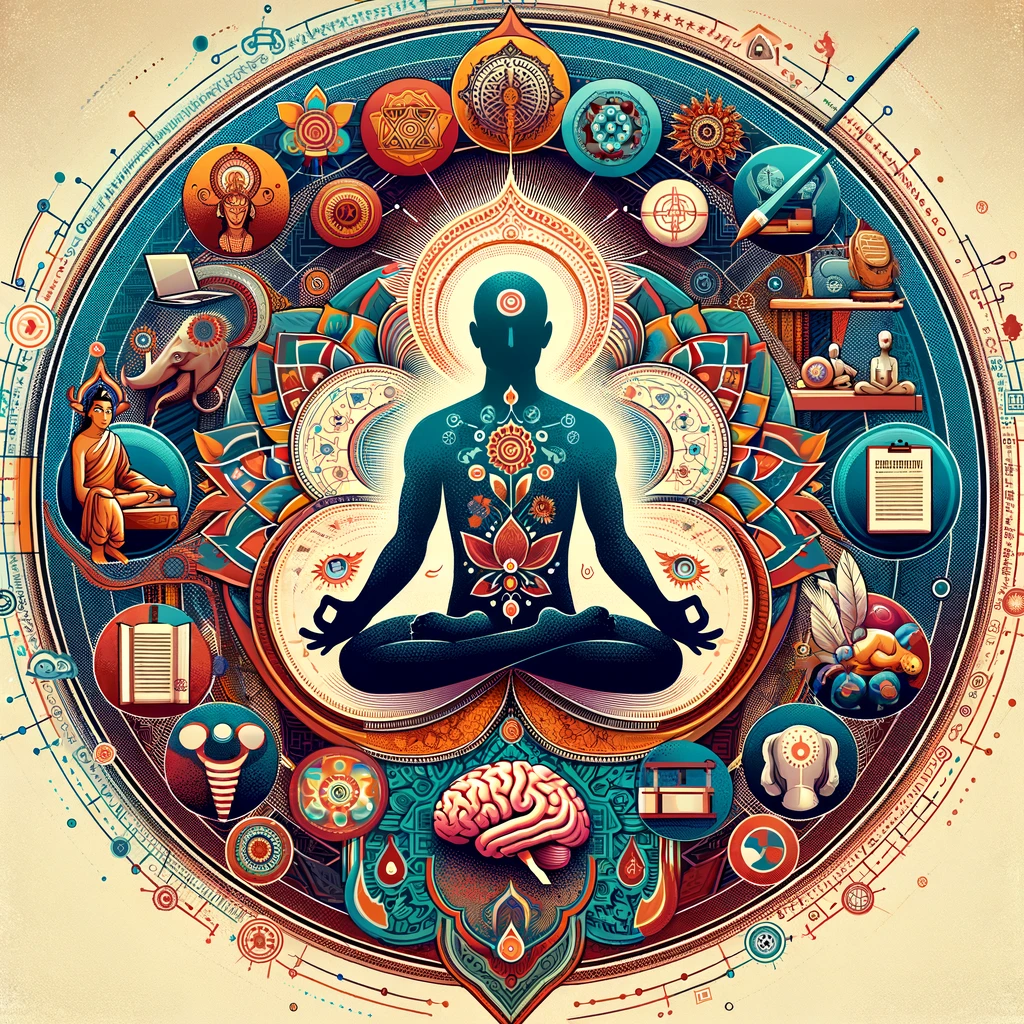The spark to explore the history and development of psychology in India ignited while I was engrossed in preparing my assignment. This intellectual expedition led me to a profound discovery: Indian psychology is not just a field of study but a deep, philosophical journey rooted in the ancient texts like the Vedas, Upanishads, and Shrimad Bhagavad Geeta. This moment of revelation was exhilarating, as I realized the intrinsic connection between Indian psychology and the foundational pillars of Sanatana Dharma—Dharma (duty), Artha (prosperity), Kama (desire), and Moksha (liberation). This intricate relationship mirrored the insights I encountered in Unraveled Mahabharata Dharma Discourses by Ami Ganatra, deepening my understanding and appreciation for this ancient wisdom. Here is a more detailed exploration of the rich tapestry that Indian psychology weaves, bridging millennia of philosophical thought with contemporary psychological insight.
From Ancient Roots to Modern Realizations
The foundation of Indian psychology is deeply entrenched in its ancient scriptures, which provide a sophisticated understanding of the mind, consciousness, and self. These texts employ a distinctive approach that prioritizes introspection, meditation, and the pursuit of wisdom over empirical analysis. This divergence from Western psychology’s empirical emphasis offers a more holistic understanding of human nature, advocating for a life that balances spiritual enlightenment and worldly duties.
Philosophical Underpinnings and the Quest for Balance
At the core of Indian psychology lies the enduring philosophy of Sanatana Dharma, which promotes an interconnected view of existence and a relentless pursuit of truth through self-awareness. This age-old wisdom is exemplified through the practice of yoga, which symbolizes the union of mind, body, and spirit. Yoga’s techniques, such as meditation and pranayama, serve not just as physical exercises but as profound mental disciplines that foster mindfulness, enhance focus, and promote emotional equilibrium.
Synthesis with Contemporary Psychological Practices
Over time, Indian psychology has seamlessly integrated with modern psychological methodologies, embodying a unique approach that marries age-old wisdom with scientific inquiry. This synthesis is evident in the contemporary application of traditional practices like meditation and yoga within therapeutic contexts, showcasing their effectiveness in addressing anxiety, depression, and stress. This blending of ancient and modern has led to a paradigm shift in psychology, embracing a holistic perspective on mental health and well-being.
The Evolving Landscape of Indian Psychology
The field of Indian psychology is currently experiencing a renaissance, with an increasing recognition of its value in shedding light on the complexities of the human psyche. Academic institutions across India are now offering programs that fuse traditional psychological teachings with modern theories and practices, preparing a new cadre of psychologists equipped to navigate both realms. This evolution signifies Indian psychology’s potential to make unique contributions to the global dialogue on mental health, offering fresh perspectives that challenge conventional understandings and advocate for a more integrated approach to well-being.
Future Prospects and Global Implications
Looking ahead, Indian psychology holds the promise of enriching the global understanding of psychology with its unique blend of ancient wisdom and contemporary science. Its principles offer valuable insights into achieving harmony and balance in the face of modern life’s complexities. As this field continues to grow and evolve, it will undoubtedly provide valuable frameworks for addressing the psychological challenges of today and tomorrow, reinforcing the universal relevance of India’s ancient philosophical heritage.
In conclusion, the journey through the history and development of Indian psychology reveals a profound narrative of ancient wisdom intertwined with modern insights. This exploration not only deepens our appreciation for the rich heritage of Indian psychology but also highlights its significant contributions to understanding the human condition. As we delve deeper into this fascinating field, we uncover the timeless relevance of ancient practices in addressing contemporary psychological issues, bridging the gap between the past and the present in the ongoing quest for knowledge and well-being.




